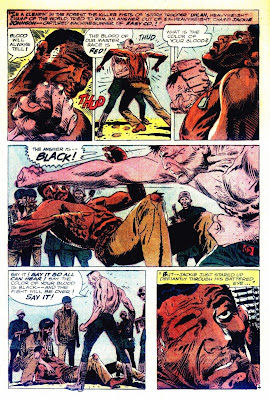The Sgt. Rock & Easy Co. story in DC's Our Army At War 160 (November 1965) again features Jackie Johnson. The story retcons a heavyweight boxing champ background for Jackie, with him having lost the title prior to enlisting, to a Nazi paratrooper, whom he meets again on the battlefield. Rock, Wild Man, and Jackie are captives of the Nazi scum, and the Nazi heavyweight boxer gives Jackie a rematch, with the intent of beating Jackie into submission and getting him to admit his blood is a different color than that of the 'Master Race'. As he watches Jackie deliberately take a beating (to avoid Rock and Wild Man getting killed in retaliation, should he beat the Nazi in the bout) but stubbornly refuse to give the Nazi his satisfaction, Rock recalls seeing Jackie in the ring at Madison Square Garden when he was a boxer himself, watching Jackie for pointers on how to fight well. Rock had recognized then the additional burden Jackie had been carrying, of having to prove himself twice over, as an individual fighter, and as an African American. When Jackie had eventually won the title, and then lost it to the Nazi, the latter had taken the opportunity to use his victory as propaganda for the supposed superiority of the 'Master Race' - WWII was a war about racism.
Apparently based on an amalgam of African American heavyweight boxing champs, Jack Johnson and Joe Louis, the character of Jackie Johnson fought as a representative of his race like the original Johnson, and fought against a Nazi just as Joe Louis had fought against a German, Max Schmeling, who was not a Nazi but whose victory was used as propaganda by the Nazis.
In the story Rock convinces Jackie to stop holding back, and Jackie defeats the Nazi. The rest of the Germans open fire on the failed representative of the 'Master Race' as well as Jackie, with Rock and Wild Man retaliating but believing they're too late to save Jackie. Easy Co. turn up and pull off a rescue, and both Jackie and the Nazi boxer are still alive. The whole time the Nazi boxer had been trying to make Jackie admit their blood was different, but is forced to change his viewpoint when a transfusion from Jackie saves his life. Jackie responds with the line, "You're catching on, buster!" This story is a refutation of the 'one drop of blood' racist criterion for establishing distinction between Caucasian and African Americans, and confirms both as fellow human beings. It simultaneously affirms the rightness of integration, and slams the racist notion of white supremacy. The timing of its publication, the rarity of African American depictions in comics at this time, along with the very strong anti-racist message, again suggests a connection with both the Civil Rights Movement and the country's need to recruit African Americans for the Vietnam War against a backdrop of anti-war sentiment amongst the African American community. The significance of Jackie being a boxer appears related to Muhammed Ali's conversion to the Nation of Islam in 1964. Ali failed the qualifying test for the armed forces in 1964, but it wasn't until 1966 that his refusal to obey the draft began, which led to his imprisonment and loss of his title. So this issue of Our Army At War is not a response to his refusal to enlist, but is perhaps aimed at defusing the effect of Ali's association with the Nation of Islam, which was strongly anti-Vietnam War. Here's the story, by Bob Kanigher and Joe Kubert:

















KB: Great post in a series of great posts! This one is my favorite so far in your series during Black History Month. I don't think Kubert's art - so organic, living, and powerful - was ever better. And what a great, great story! I enjoyed your analysis very much. As always, it places things in a wonderful context.
ReplyDeleteMan, DC was so great in the silver age. This issue is up there with the all time greats. -- Mykal
Mykal: I so agree regarding Kubert's art here and DC was way up there ahead of everyone in cutting edge socially relevant storytelling. When you think of the time that this was written, Kanigher's ability to picture perfect racial harmony in Easy Co. while making an extremely loud anti-racist statement I'd say puts him way ahead of his time. Dude, I also think this one belongs in a comic book hall of fame. Kanigher and Kubert had a great understanding, and when their synergy is really strong, you get incredible stuff like this.
ReplyDeleteKB: I recieved the Our Army At War No. 120 today. I will post it in a couple of days. Odd, though - the story "Battle Tags for Easy Co., doesn't seem to feature Jackie. It is a great story, though, with great Kubert art, but I'm not seeing Jackie. No sweat, though, as I would be posting it anyway. -- Mykal
ReplyDeleteMykal: Hmm - I guess my information source must have been wrong. No worries though. Look forward to reading it anyway, as I don't have that issue in any form.
ReplyDelete